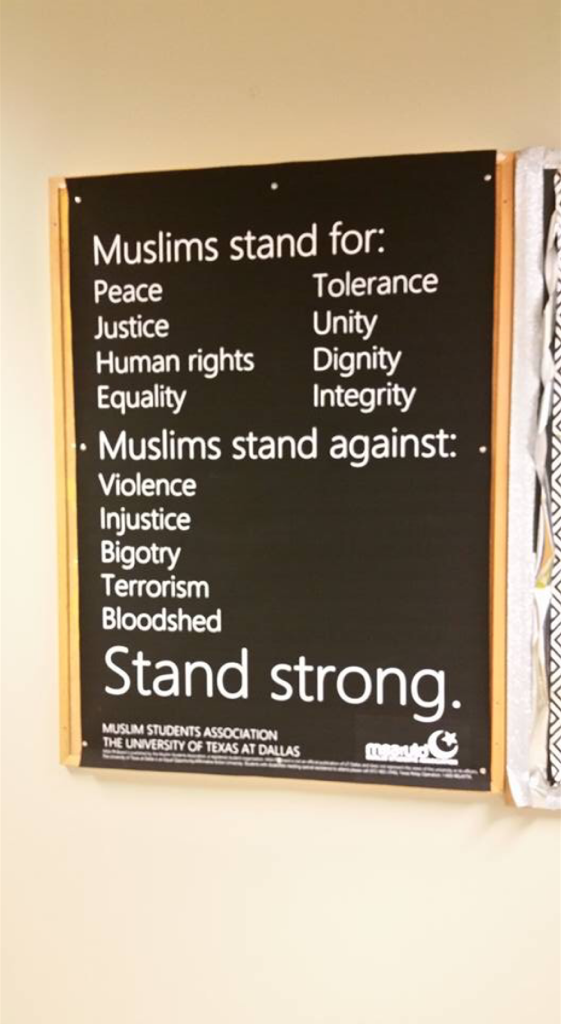Members redesign display to combat misinformation, prejudice
Several months after two unknown individuals vandalized a display for a campus religious group, neither UTD police nor members of the group have made much progress in trying to identify the perpetrators.
On Feb. 17, two men, who Lt. Ken Mackenzie said he believed to be students, were caught on camera walking into the Student Union, examining the Muslim Student Association’s board and vandalizing it with phrases such as “Terrorists” and “Islam is not a religion of peace.”
Although the two suspects’ faces were caught on camera, UTD police are still in the dark about the identity of the alleged culprits.
Nashotta Luckett, the investigative specialist assigned to the case, combed through three weeks of security camera footage to see if she could find any identifying clues. Despite her and the police department’s efforts to look through the videos, reach out to students, faculty and staff and post the footage on social media, no leads have been found in the case.
“We haven’t received anything. No calls, no emails, nothing,” Luckett said.
As the case moves forward, UTD PD are still searching for any leads they can get about who the suspects are. MacKenzie said the department has classified it as criminal mischief, but he acknowledged the district attorney has the option to elevate the charges to include a hate crime if the suspects are identified. If they are found guilty of criminal mischief, the two could face a maximum of six months in the Collin County jail.
“The university and the police department take this, especially since it was against a religious organization, type of crime very seriously,” MacKenzie said. “I can tell you I assigned this to Investigator Luckett and she has spent a lot of man-hours in this. Like I was saying, we don’t want these guys to have the last laugh and they thought this was a joke.”
The members of the group that this “joke” was aimed at were also the ones laughing the least.
When accounting junior Mariam Allahrakha first heard of the defacing of the MSA bulletin board, she said it came as a surprise.
“I think initially we were just all really shocked because it wasn’t something we were expecting to happen,” Allahrakha, the president of MSA when the incident happened, said. “UTD is a very tolerant campus, there’s a lot of diversity. So I think our initial reaction was shock, and then kind of just hurt.”
The lack of closure has been hard to deal with for Allahrakha and other members of MSA.
“I got a call that said that (UTD police) still hadn’t been able to find the person, even though they posted videos. No one had come forward because no one knew who they were,” she said. “That someone could do this and (we) don’t even know who they are and we can’t find them or hold them responsible (is frustrating).”
Although there has still been no progress in finding the individuals responsible for the acts, the members of MSA have moved on and rebuilt their bulletin board. While the last year’s board was more focused on the social aspects of the group, the new board, which is black with stark, white letters, centers on what Islam represents.
“Our historian came up with a really good idea that said, ‘Islam is not a religion of hate, it’s a religion of peace and we promote peace.’ It just went through all the things MSA stands for and what Muslims stand for and what Islam really is,” she said. “It was just to show and highlight that this is who we really are and that is what we kind of did in response to the vandalism that happened to our board.”
Allahrakha said having to debunk the myths about Islam is part of the uphill battle she faces as a Muslim.
“Most of us have all grown up in the (United States) and this is where we were born and raised,” she said. “To have to still prove that, you know, this is our country, we love it just as much as everyone else … it is really frustrating that you constantly have to prove something that isn’t true and that you think you wouldn’t have to prove.”
While Allahrakha and the other members of MSA are planning to move on by doing more outreach to the campus community, she said the incident still shows the hate Muslims have to face.
“It comes off kind of in a negative light to even the campus because I know I have friends who were non-Muslims and were not part of MSA who were like, ‘Hey, I saw y’all’s board, is everything OK?’ Because I think it’s just an attack on the community,” she said. “I don’t think it’s per se the board, that’s something we can easily replace — it’s what it stands for behind that.”











